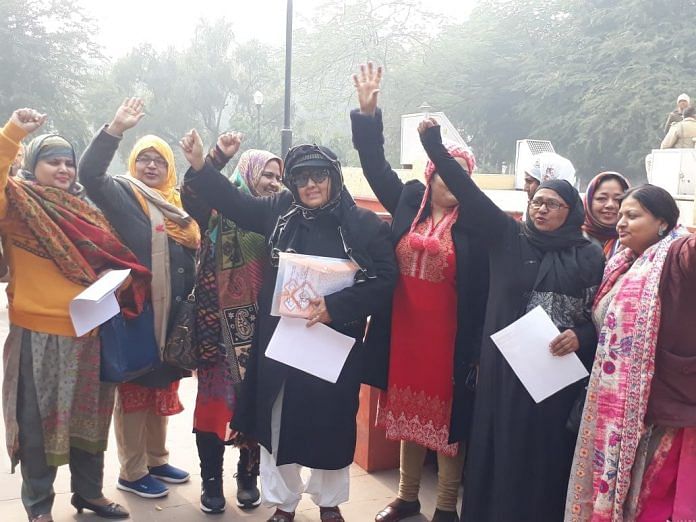Muslim women’s body wants the commission to examine issues of age of marriage, share in inheritance and custody of children after separation.
New Delhi: Muslim women representatives are urging the Law Commission to codify Muslim personal laws instead of bringing in a uniform civil code even as the fate of the government’s controversial triple talaq bill remains uncertain.
A meeting took place Wednesday between the commission and members of the Bharatiya Muslim Mahila Aandolan (BMMA), the group that spearheaded the campaign against triple talaq. The meeting was part of the commission’s deliberations with stakeholders on the matter of the Uniform Civil Code. A report on the issue is due before the panel’s term expires next month.
“We told the commission that the Uniform Civil Code is not a solution to Muslim women’s problems…that is a different debate. Other communities already have their laws codified, so why not Muslims?” Zakia Soman, founder of the BMMA told ThePrint.
“We suggested that the commission look at the issues of age of marriage, women’s share in inheritance and custody of children after separation,” Soman said.
The BMMA, founded in January 2007, is an autonomous, secular, rights-based mass organisation led by Muslim women that fights for the citizenship rights of the Muslims in India.
The commission had earlier indicated to ThePrint that while a UCC may be far-fetched, it is likely to recommend tweaking of personal laws of different religions in its report.
‘In interest of Muslim women’
Under the uncodified Islamic law, adolescents can be married off after they attain puberty, women are entitled to only half of their brother’s share in property, and custody of children remains with the father on separation once they attain a certain age.
“It is in the interest of Muslim women that Muslim personal laws are codified to bring them at par with other women,” Soman said.
The commission earlier said it would not look at the issue of instant divorce among Muslims since the apex court has already ruled in the matter, and the government’s bill is pending in Rajya Sabha. It will also not examine the issues of nikah halala and polygamy among Muslims since the matters are sub-judice.
The All India Muslim Personal Law Board (AIMPLB) had also met the commission in May to explain Islam’s position on a range of issues, including adoption, inheritance and child marriage, among others. In what could be a sign of receptiveness to change, the AIMPLB had said it would be open to “reasonable changes to our personal laws suggested by the commission, as long as they are not in conflict with Islam”.
However, the AIMPLB had made its opposition clear over the issue of adoption. In Islam, adoption is prohibited for the fear of sexual relations between the adoptive parents and child, the board claimed.
The claim has, however, been refuted by Soman, who told the board that a precedent had already been set by the Supreme Court in 2014 in the Shabnam Hashmi judgment, where it said personal law cannot curtail a Muslim’s right to adopt a child under the secular Juvenile Justice Act.
“The Quran encourages taking care of orphans and upholding the rights of children…but they (AIMPLB) look at everything from a narrow prism,” Soman said.
The AIMPLB is now expected to meet the commission on 25 July.
“They will tell us what the exact source of their stand on the issue of property and inheritance is when they meet us,” an official of the Law Commission said.



